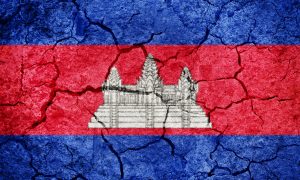Foreign governments and human rights groups have called for the release of Mech Dara, a Cambodian freelance journalist who was arrested on Monday and charged with incitement.
The 36-year-old, who has conducted extensive reporting into human trafficking and the country’s epidemic of online scamming operations, was arrested on Monday afternoon in Koh Kong province.
Dara has since been charged with “incitement to provoke serious social unrest,” stemming from a series of social media posts made last month, the Phnom Penh Municipal Court said in a statement. It said that he had confessed to the charges and has been placed in pre-trial detention. The charges relate to social media posts that Dara made on September 20, 23, 26, 28, and 29. Each count carries a maximum prison sentence of two years.
In a joint statement, 46 civil society groups and media freedom organizations issued a statement calling for Dara’s “immediate release,” stating that his arrest was “a clear attempt to intimidate and silence him and other journalists in a country where press freedoms are routinely curtailed.”
In a statement, the U.S. Embassy in Phnom Penh said that it was “deeply troubled by the arrest of Mech Dara” and encouraged the authorities “to engage w/ diverse voices & foster a free, independent press.” The USAID Cambodia Counter Trafficking in Persons said that it “stands publicly in its support for this great person and anti-trafficking hero.”
Phil Robertson, director of the group Asia Human Rights and Labour Advocates, said in a statement that his arrest was “emblematic of the Cambodian government’s repressive, over the top reaction to any sort of criticism from the media.” The arrest “shows just how far Cambodia’s government is willing to go to squelch independent reporting,” said Shawn Crispin of the Committee to Protect Journalists.
Indeed, Mech Dara’s career has encapsulated the steep decline of press freedoms in Cambodia over the past 15 years, as the ruling Cambodian People’s Party (CPP) has moved to shut down the pockets of freedom created by a United Nations peacekeeping mission in the early 1990s. He began his career at The Cambodia Daily, which was shut down by the government in 2017, and later worked for Voice of Democracy, which was closed in 2023, on the orders of former Prime Minister Hun Sen. He also spent some time at The Phnom Penh Post, which was forcibly sold to government-friendly Malaysian investors in 2018.
None of this has stopped Dara from reporting extensively on the country’s gambling and online scamming industry, where tens of thousands of people (mostly foreigners) have been forced, under threat of violence, to conduct fraud operations targeting people across the globe. In recognition of his coverage of Cambodia’s scam compounds, Dara was last year granted the U.S. State Department’s human trafficking Hero award.
Most explosively, Dara has produced a number of reports tying the scam operations to prominent tycoons and high-ranking members of the CPP. One such figure was Ly Yong Phat, a CPP senator and businessman based in Koh Kong, whom Dara’s reporting has linked to scam compounds. Last month, Ly Yong Phat was sanctioned by the U.S. Treasury Department for his connections to scam operations and human trafficking.
It is unclear what social media posts prompted Dara’s arrest. On his X account, however, the reporter would frequently post videos and photos highlighting his country’s vast asymmetries of wealth and power, often with sardonic comments attached.
On September 29, according to a report by CambojaNews, Dara posted photos to Facebook and X that appear to show damage caused by a quarry operation to the concrete stairs leading to Ba Phnom, a pagoda and local tourist attraction in Prey Veng province. Prior to Dara’s arrest, provincial officials in Prey Veng issued a statement accusing Dara of wanting to “cause social disorder or confusion” after he posted a photo of the quarrying activity. This was duly amplified by regime-aligned media outlets including Fresh News, which branded Dara’s post “fake news.”
It is likely that social media posts are a pretext. As Jacob Sims wrote in these pages yesterday, Dara’s arrest was likely “a retaliatory move” after the sanctioning of Ly Yong Phat, or at the least, a move designed to silence Dara’s excavation of the activities of powerful people.
In his social media posts, Dara lamented often that foreign governments and organizations were willing to voice their support for press freedom in Cambodia, and fund endless workshops, but not to provide the resources necessary to keep journalists like him working. His arrest now provides a stiff test of just how far this support extends.

































